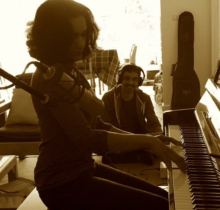THE PIANO

I grew up in a small locality in Kuwait. On my 3rd birthday, my uncle gifted me a tiny keyboard. I spent all my time plonking on it. Although my traditional Malayali parents knew nothing about classical piano and even though lessons were expensive, they found me a good teacher.
As my studies advanced, my teacher suggested that we buy an instrument. It was beyond my parents’ reach though. For many years, I practised on a keyboard.
In the 80s, my dad worked two jobs. In spite of his busy schedule, nurturing my talents was priority for him. He would drive me twice a week, one hour one way, sleeping in his car while he waited for me to finish my lessons. He began saving up to buy his musically keen daughter, a “real” piano.
On my 13th birthday, my dad surprised me by taking me to a Kawai showroom. I swooned at the sight of stately Japanese pianos, lined up majestically beneath soft spotlights. My father asked me to choose one. What an emotional moment it was for both of us. I rejoiced at the fact that I could now go on to fulfil my dreams of being a concert pianist someday.
Exactly a week later, our lives changed forever. On August 2nd 1990, Saddam Hussein sent the Iraqi army rolling into Kuwait on a warm midsummer night.
We woke up to the sound of gunfire and tanks in the streets.
The Iraqi army pillaged and pilfered. From our apartment, my brother aged 6, and I aged 13, watched in horror as trucks pulled up in the distance. Prisoners were roughed up, tied to stakes and shot.
After about a month of living under virtual house arrest, my father made the heart rending decision to move us out of our home and closer to Indian friends. That meant leaving everything behind and going away, knowing that we would perhaps never come back to our home, and our life as we knew it.
I couldn’t get over the pain of leaving my instrument behind.
After weeks of living in a two bedroom flat with eight other people, our parents made the decision to get out of Kuwait somehow. We bought bus tickets to Baghdad and under cover of night, crossed the Basra border into Iraq.
Baghdad was a city torn by years of turmoil. Refugees like us, milled. The streets were lawless and filthy. We were herded into a hotel where we stayed for a few weeks. The conditions were appalling.
The Center handling the refugees finally sent us to Jordan. We were split from our friends who were sent to camps in the desert where they lived under harsh weather conditions. My family and I were sent to Amman airport where along with hundred of others, we slept on the floors and drank water from the bathrooms. The Red Cross gave us food packets. Soon, we were deported to India.
India was a huge shock. Having lived in a completely different context as a child, and given the intensity of the traumatic experiences I had been through, I found it hard to accept my new circumstances.
I had missed nine months of school and no institution was willing to take me. Then out of the blue, the principal of a prestigious institution gave me a full scholarship to study at her school, without dropping a year.
The Allied Forces had moved into Kuwait. I watched emotionless, as clips of carpet bombing played out in the news. I wondered about my home and the beautiful piano that I had had so briefly, that I had so fiercely yearned for, loved and lost.
Nine months after Desert Storm, my father, who was an engineer in the Kuwait Fire Service Directorate, was called back to work. We waited with bated breath to know from him about what had happened to our home.
Our building was partly damaged but still standing. On our floor, the two adjacent flats had been looted and gutted.
When my father went into our house, he found everything the way we had left, that fateful night when we had fled! Under the thick velvet cover that my mother had stitched, sat my beautiful Kawai piano, unscathed! It had survived the war!
I went back to Kuwait soon afterwards. Many of my classmates returned with I went on to finish high school at the school that I had been in from kindergarten, and with the friends that I had known for 18 years.
My piano has since moved 10 times in 27 years, across five countries. It’s an integral part of me. It gives me great happiness to share my gift with those around me.
These days, I play the piano at an aged facility for elderly residents with dementia, in Sydney.
The author, Oormila Vijayakrishnan Prahlad, is a self-representing artist, has lived in many places but, calls Kuwait her home. Currently in Sydney, she lives with her husband and two kids, aged 12 and 9 years.
Disclaimer: The views and opinions expressed in this article are those of the author and do not necessarily reflect the views of The Wonder Women World.
